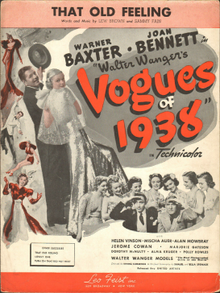| "That Old Feeling" | |
|---|---|
 | |
| Song | |
| Published | 1937 by Leo Feist, Inc. |
| Songwriter(s) | Lew Brown |
| Composer(s) | Sammy Fain |
"That Old Feeling" is a popular song about nostalgia [1] written by Sammy Fain, with lyrics by Lew Brown. [2] It was published in 1937.
The song first appeared in the movie Walter Wanger's Vogues of 1938, which was actually released in 1937. [2] Sung there by Virginia Verrill, [3] it was nominated for the Academy Award for Best Original Song in 1937 but lost out to "Sweet Leilani".
The song was immediately a hit in a version recorded by Shep Fields and His Rippling Rhythm Orchestra, considered to have spent fourteen weeks on the charts in 1937, four at #1. (The charts did not actually exist in those days, but reconstructions of what they would have been give those statistics. [2] ) A version was also recorded by Jan Garber, which charted at #10. [2] )
In 1952, it was included in the Susan Hayward movie, With a Song in My Heart where Jane Froman sang it in a dubbing for Hayward. Patti Page, as well as Frankie Laine and Buck Clayton, had hit versions of the song in 1955.
Betty Hutton sang it in Spring Reunion (1957). Frank Sinatra had a hit with the song in 1960 from the album Nice 'n' Easy .
The song is also featured in the 1981 film, Body Heat , played at an outdoor summer concert by a big band on stage.
In the 1971 novel Summer of '42 by Herman Raucher, the song is prominent in chapter 19. That's when the main character, Hermie, visits Dorothy shortly after she has received the news of her husband's death in World War II. The song clearly was the favorite of Dorothy and her husband, and she dances with Hermie as the phonograph record plays.
The title of the song was given to a film in 1997, starring Bette Midler and Dennis Farina, where it was performed by Patrick Williams and by Louis Armstrong and Oscar Peterson. [2] [4]